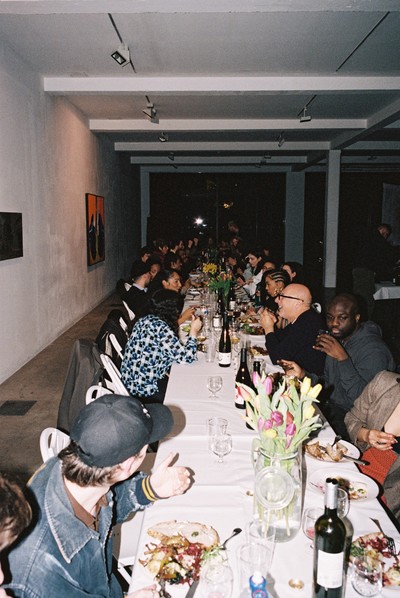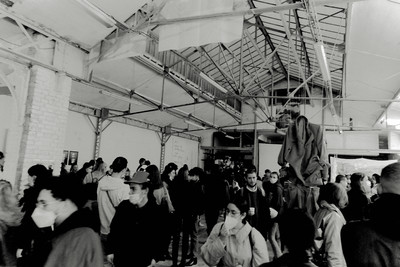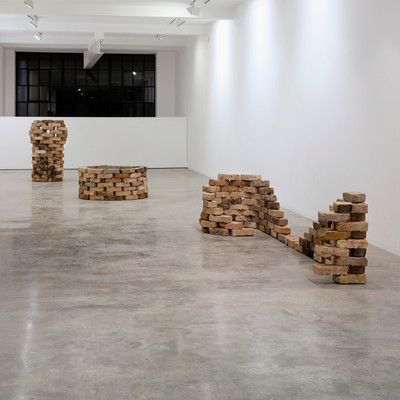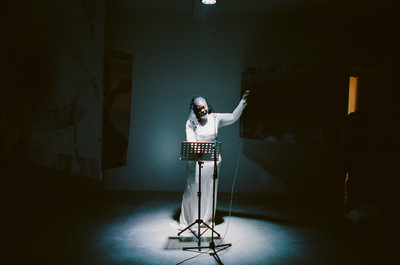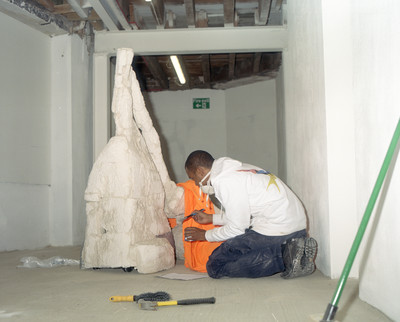By Rahim Attarzadeh
For Ben Broome, curator and founder of Drawing a Blank, a group exhibition series supporting young artists, thinking outside the box challenges the stereotype of every white wall space.
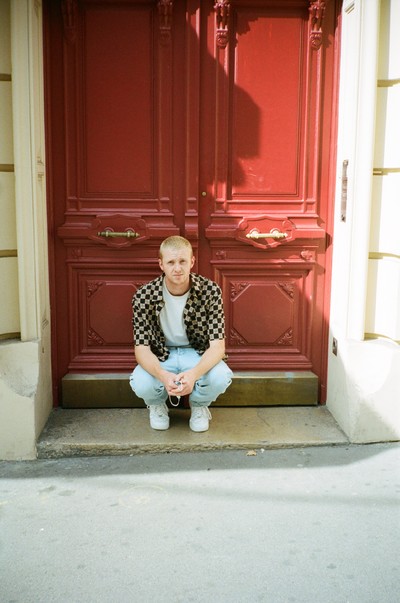
Ben Broome, 2020
Photograph by Djiby Kebe
If you were to take art off the wall, where would you put it? Ben Broome thinks he might have the answer. His Drawing a Blank group exhibition series celebrates emerging artists, taking them out of what has often been perceived to be as Broome coins it, a ‘stuffy’ white wall, or gallery space. From abandoned police stations in Harlem, New York to closed down book shops in central London, Drawing a Blank celebrates a sprawling countercultural approach to curation and exhibition.
Despite being someone who always felt detached from art growing up, Broome has avalanched himself as an unwavering young gun. Having exhibited works from the likes of artist Kesewa Aboah, filmmaking and photography duo Jalan and Jibril Durimel, designer Bianca Saunders, and photographer Frank Lebon, just to name a few, his coterie of collaborators reads like an indubitable A-team across the fields of contemporary art, photography, and design today.
‘I remember going on a school trip to the National Gallery when I was 16 and being completely disinterested.’
To challenge the confines of a gallery space with a sense of chaotic yet sensorial disorder is only one component of Ben’s curatorial DNA. Balancing the art of integrity and irreverence whilst simultaneously avoiding and accepting the inevitability of a commercial partnership lays the foundations for his approach. Daring to walk an iconoclastic line, with dreams of putting a punk band in institutions such as Gagosian, his eclectic vision for the future could prove why white wall spaces symbolise beacons of Broome’s hope for change. With a quip about whether or not he’d want his own show at the Tate, he simply responded, ‘Who am I kidding, of course I want that!’ But as Ben Broome continues to develop and mature, one constant remains, is it time to ‘sell out’ and how would he redeem himself?
Broome sits down with System to discuss why exclusivity is now outdated, how he continues to fuel his visceral desire to simultaneously construct and deconstruct and despite his seemingly supersonic rise to prominence, he’s been playing the long game this entire time.
Who is Ben Broome?
Ben Broome: That’s one to ask my therapist.
How did you feel about what can sometimes be seen as this elitist white wall space?
Ben Broome: I didn’t engage with art growing up. To me, it manifested itself in stuffy galleries. I remember going on a school trip to the National Gallery when I was 16 and being completely disinterested. I didn’t engage with art.
Was it more a case of who wasn’t being exhibited at institutions like the National Gallery?
Ben Broome: Like many middle class white boys of a certain age, my interest in art manifested itself through graffiti and the desire to rebel. I came across the Basquiat’s and the Keith Haring’s, then from that point, I was able to develop my own tastes.
How do you go about finding the spaces you currently work in? Drawing a Blank makes the ephemeral desirable. The process must have been chaotic at times.
Ben Broome: I hit the ground. I cycle around on my bike. I knock on doors. I call numbers in windows. I’m looking for that place that isn’t listed on the internet, because if it is, the landlord knows what it’s worth and they’ll probably be looking for a long-term tenant. I’m trying to find somewhere in between leases, who I can chuck 1000 pounds at and take it for a week, two weeks, three weeks. That was how I initially found spaces. Whereas today, I just have access to another side of art spaces. Places that were previously inaccessible.
Given your DIY approach, do the spaces you find now amplify a greater sense of congregation and transformation?
Ben Broome: I can slowly start to enter more art spaces. Not so much institutions yet, but I’m beginning to find more budget for exhibitions I can be more ambitious with. The place I last exhibited in was a fairly typical white wall gallery. It used to be an institution called the Parasol Unit. That was one of the first times I entered an art space that looked every ounce like a museum. Those white wall spaces are harder to transform because people are so used to behaving in a certain way. To transform, you have to disrupt. You have to bring a different audience of people who don’t frequent those types of places. Like bringing a punk band into a white wall or gallery space.
The process is punk in itself. You’ve often spoken about how Drawing a Blank cultivates a community. Your friends and your collaborators are given equal opportunity to express themselves creatively. But what about you? Do you have a vision in mind for yourself?
Ben Broome: Curation is my artistic practice. I feel as though I’m already expressing myself creatively through the exhibitions I organise but my vision for the future is in constant flux. It’s funny, Drawing a Blank was a name I came up with when I was 20. I remember I was at work trying to rack my brain for a name ahead of my first exhibition. I was literally drawing a blank. I love a pun for a name but it’s morphed into something else since then. The spirit and the ideology behind that series is something that I want to continue with in all my curatorial projects. I guess it’s fuelled by a desire to disrupt the art system.
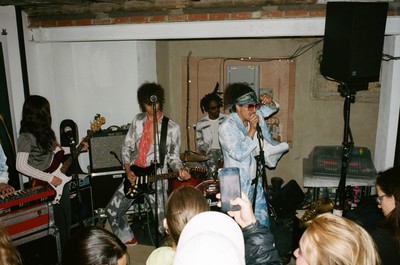
Onyx Collective and Pretty Sick, London, 2019
Photograph by Alessandro Tranchini
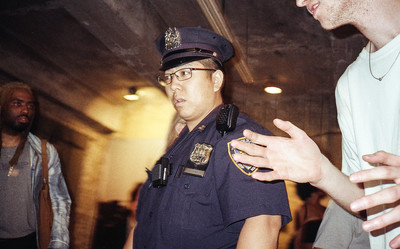
Even the NYPD came down to check out the Drawing a Blank show in Harlem, NYC, 2018
Photography by Chase Hall
In the editor’s letter you wrote for System last year, you mentioned that it’s not always a question of whether or not you will sell your soul but is it now more a case of how many parts of your soul you’ll end up selling?
Ben Broome: The acceptance that you have to sell your soul at some level is really important. As a curator, I will continue to have to compromise. The challenge is figuring out at what point does the compromise actually compromise your integrity. As soon as the compromise crosses those lines, then you know you have to put the brakes on.
Fashion has become this patron of the arts. It’s now financing culture, with the fashion brands who think like curators and have the economical bandwidth to activate contemporary art. In the noughties, brands like Supreme were putting artists such as Dan Colen and Richard Prince on skate decks before they were being exhibited at the MoMa. How are you balancing the dichotomy between maintaining a level of authenticity and autonomy in your work and accepting commercial partnerships?
Ben Broome: It’s really fucking difficult and I’ve said no a lot more than I’ve said yes. The brand you mentioned knows what they’re doing because they don’t ask for much. For me it’s about necessity - is my fee going to enable me to realise a passion project that otherwise wouldn’t happen? If the answer is yes then it’s worth doing.
Do you see your practice as challenging the system? Pushing things forward. The obsession to disrupt. Is that a healthy way of thinking?
Ben Broome: I think it’s grandiose to say you’re challenging the system. It’s a far bigger machine. What I endeavour to do is create a microcosm whereby I can help my artist friends engage with an audience who seem to appreciate what I do. Whether or not that is impacting the wider art world remains to be seen. There is a power in continually pushing things forward and not subscribing to industry opinion. I like sticking to my guns and it’s always stood me in good stead. I’m not curating shows at the Tate. Maybe I will get there one day. Who am I kidding, of course I want that! I’m interested in the slow burn. I’m not shooting a cover with Beyoncé.

Chassol, Paris, 2020
Photograph by Miiiiiyeon
So Ben Broome makes five year plans?
Ben Broome: I’d say Ben Broome makes 20 year plans
You’re playing the long game but Drawing a Blank is all about the allure of ephemerality… the pop-up?
Ben Broome: Impermanence is what makes Drawing a Blank a special thing. It happens and then it’s over. It doesn’t matter what gallery you’re showing at. Even if it’s at the Gagosian. The exhibition goes up and it comes down and the next time those works are gathered together might never happen or it might be a decade later. Ephemerality is really important to me. It’s key to this human condition of a curator.
If a major conglomerate approached you with a million dollar offer, what would you say? Is it a case of selling out to buy in?
Ben Broome: I would absolutely take their money. I could set up a gallery which would define the rest of my life. I could set up a residency project that would provide assistance for artists for decades. I could set up a grant fund. There’s so much power in having capital. If that came across my desk, I’d be insane to say no. It doesn’t matter who you are. Money talks and you gotta eat.
How would you redeem yourself?
Ben Broome: You can be a sellout who does amazing things. You can be a sellout who uses that cash to recontextualise what you do. Or you can be a sellout who just sells out and buys a big fucking house!
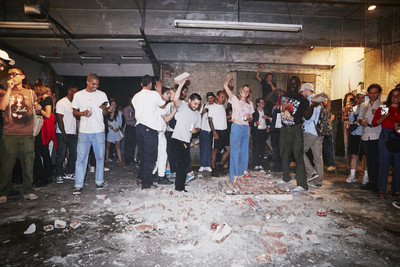
Laura Genes, NYC, 2018
Photography by Hayato
